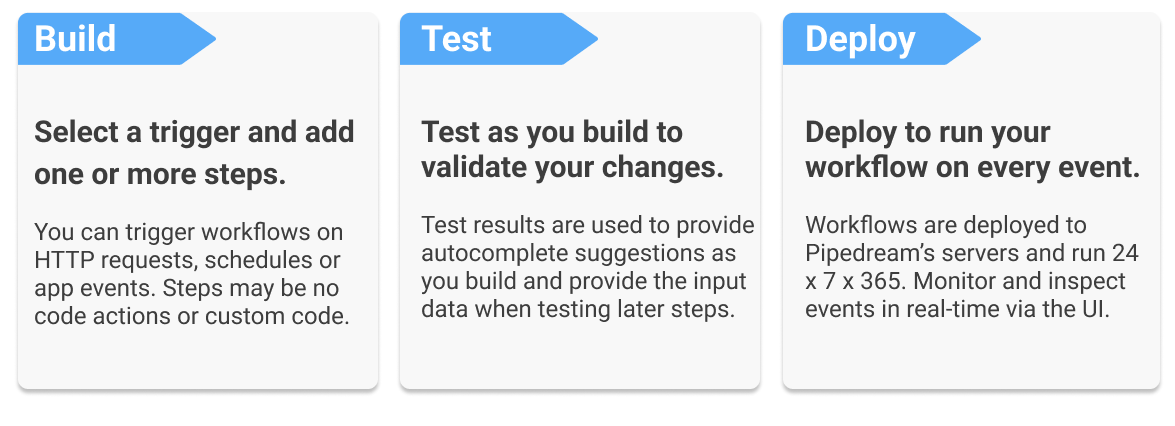# Introduction to Pipedream
Pipedream is the fastest way to automate any process that connects APIs. Build and run workflows with code-level control when you need it, and no code when you don't.
The Pipedream platform includes:
- A serverless runtime and workflow service
- Open source triggers and actions for hundreds of integrated apps (opens new window)
- One-click OAuth and key-based authentication for hundreds of APIs (use tokens directly in code or with pre-built actions)
Watch a demo or review our quickstart guide:
# Getting Started
To get started, sign up for a free account (opens new window) (no credit card required) and follow our quickstart guide to create your first workflow.

Once you understand the basics of workflow development, learn how to get more out of Pipedream:
# Use Cases
Pipedream supports use cases from prototype to production and is trusted by 200k+ developers from startups to Fortune 500 companies:

The platform processes billions of events and is built and priced (opens new window) for use at scale. Our team (opens new window) has built internet scale applications and managed data pipelines in excess of 10 million events per second (EPS) at startups and high-growth environments like BrightRoll, Yahoo!, Affirm and Instacart.
Our community (opens new window) uses Pipedream for a wide variety of use cases including:
- Connecting SaaS apps
- General API orchestration and automation
- Database automations (reach out (opens new window) to learn about connecting to resources behind a firewall)
- Custom notifications and alerting
- Mobile and JAMstack backends
- Rate limiting, request smoothing
- Event queueing and concurrency management
- Webhook inspection and routing
- Prototyping and demos
# Open Source
Pipedream maintains an open source component registry (opens new window) on GitHub so you can avoid writing boilerplate code for common API integrations. Use components as no code building blocks in workflows, or use them to scaffold code that you can customize. You can also create a PR to contribute new components via GitHub.
# Contributing
We hope is that by providing a generous free tier, you will not only get value from Pipedream, but you will give back to help us improve the product for the entire community and grow the platform by:
- Contributing open source components to our registry (opens new window) or sharing via your own GitHub repo
- Asking and answering questions in our public community (opens new window)
- Reporting bugs (opens new window) and requesting features (opens new window) that help us build a better product
- Following us on Twitter (opens new window), starring our GitHub repo (opens new window) and subscribing to our YouTube channel (opens new window)
- Recommending us to your friends and colleagues
Learn about all the ways you can contribute (opens new window).
# Support & Community
If you have any questions or feedback, please reach out in our community forum (opens new window).
# Service Status
Pipedream operates a status page at https://status.pipedream.com (opens new window). That page displays the uptime history and current status of every Pipedream service.
When incidents occur, updates are published to the #incidents channel of Pipedream's Slack Community (opens new window) and to the @PipedreamStatus (opens new window) account on Twitter. On the status page itself, you can also subscribe to updates directly.
